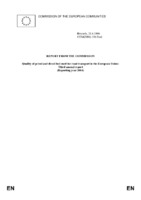| dc.description.abstract | Directive 98/70/EC1 sets technical specifications on health and environmental grounds for fuels to be used for vehicles equipped with positive-ignition and compression-ignition engines. Directive 2003/17/EC2, amending Directive 98/70/EC, requires a further reduction of the sulphur content of petrol and diesel fuels. Significant violations of the fuel specification can lead to increased emissions and might even damage the engine and exhaust after-treatment systems. In order to ensure compliance with the fuel quality standards required under this Directive, Member States are required to introduce fuel quality monitoring systems. Article 8 of Directive 98/70/EC, as amended by Article 1(5) of Directive 2003/17/EC, requires the Commission to publish annually, a report on the fuel quality in the different Member States. This third Commission Report summarises briefly Member States’ submissions, on the quality of petrol and diesel, as well as the volumes sold, for the year 20043. All Member States except France submitted national reports for 2004. The monitoring of fuel quality in 2004 shows that the specifications for petrol and diesel laid down in Directive 98/70/EC are in general met and few violations were identified. For petrol the main parameters of concern were again research octane number (RON, 34+ samples), summer vapour pressure (DVPE, 43+ samples) and distillation - evaporation at 100°C (17+ samples). For diesel the parameters of concern were sulphur content (22 samples), distillation 95% point (24 samples), cetane number (7+ samples) and density (5+ samples). Although several Member States reported non-compliant samples, far fewer samples exceeded the limit values (and the limits of tolerance for the test methods) compared to previous years. However, both the Czech Republic and Poland reported significant numbers of samples exceeding limit values. The Commission has not identified any negative repercussions on vehicle emissions or engine functioning related to these exceedances but continues to urge Member States to take action in order to ensure full compliance. Most are doing so already, and details of the action taken by Member States with regard to non-compliance are included, where provided, in the individual country chapters of the detailed report for 20044. The Commission will continue insisting that Member States ensure full compliance with the fuel quality requirements laid down in the Directive. For the abatement of air pollution and the introduction of new engine technology it is important to note that the share of <10 ppm and <50 ppm sulphur fuels increased significantly from 2001 to 2004 for EU-15. EU-10 sulphur content is significantly higher and this leads to a slight increase in average sulphur between 2003 and 2004 for the whole EU. Overall a general trend towards lower sulphur content in petrol and diesel fuel can be identified, as shown in Table 1. |

